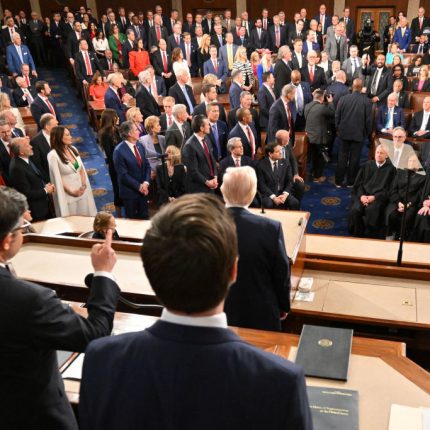In this episode of Carolina Newsmakers, host Don Curtis welcomes Brad Crone, a longtime political strategist and frequent guest on the show. The discussion covers a range of pressing political topics, including the ever-changing economic landscape, the impact of tariffs, federal budget cuts, and the shifting dynamics in North Carolina’s upcoming elections.
The Impact of Tariffs and Economic Policy
Crone begins by addressing the economic uncertainty surrounding tariffs and trade policies. He describes the ongoing situation as a “yo-yo” effect, where policies shift rapidly, creating instability for businesses and investors. One day, tariffs are imposed; the next day, they are lifted or adjusted. This unpredictability has led to market fluctuations, with Wall Street losing 1,800 points in a single week.
According to Crone, the Trump administration’s tariff policy is based on historical precedents, such as the McKinley-era tariffs, but the modern economy presents different challenges. The concern is that tariffs will ultimately be inflationary, as costs on imported goods will be passed down to American consumers. Whether it’s avocados from Mexico or automobiles from Canada, higher import taxes mean higher prices.
Federal Budget Cuts and the State’s Economy
The conversation then shifts to federal spending cuts and their potential impact on North Carolina. The administration has made clear that departments and agencies will need to determine their own budget reductions, which has led to deep concerns over how these cuts will affect essential services.
Crone describes the approach as using a “machete rather than a scalpel,” meaning that broad, indiscriminate cuts are being made rather than targeted reductions. Key areas of concern include the Environmental Protection Agency (EPA), the Department of Education, and Medicaid. North Carolina, which relies on significant federal funding for infrastructure, health care, and education, could face major challenges as these cuts take effect.
One particularly alarming issue is the projected $88 billion annual reduction in Medicaid funding. This could result in a loss of up to $2 billion for North Carolina’s hospitals and health care providers, creating financial strain on an already burdened system. Crone warns that despite promises not to touch Medicare, Medicaid, or Social Security, achieving the administration’s budget goals would require cuts to entitlement programs.
The Political Landscape in Washington
Crone provides insight into the broader political climate, particularly in Washington. He notes that Trump’s governance style is one of constant disruption, which appeals to his base but creates uncertainty for businesses and lawmakers. The administration is focused on reducing the size and scope of the federal government, but the rapid pace of change is causing concern among both Republican and Democratic leaders.
The conversation also touches on Trump’s recent State of the Union address, where he largely avoided discussing inflation—one of the biggest concerns for voters. Crone argues that while Trump’s supporters appreciate his aggressive approach, there is increasing anxiety about the long-term economic impact of his policies.
North Carolina’s Role in National Politics
Turning to North Carolina, Crone analyzes the state’s significance in the upcoming elections. As a key battleground state, North Carolina’s shifting political demographics make it a focal point for both parties. The discussion covers the potential impact of federal budget cuts on state programs and how voters might respond in the midterm elections.
One of the biggest questions is the upcoming U.S. Senate race. Thom Tillis, the incumbent Republican senator, faces potential challengers from within his own party, as well as strong Democratic opposition. Crone speculates that if former Governor Roy Cooper enters the race, it could lead to one of the most competitive and expensive Senate races in the country. If Cooper chooses not to run, a number of other Democrats may step in, leading to a crowded primary.
The Future of U.S. Foreign Policy
The discussion moves to foreign policy, particularly the situation in Ukraine. Crone outlines two competing narratives within the Trump administration. On one hand, Trump is pushing an isolationist policy, focusing on reducing the U.S. military footprint overseas. On the other, his approach to Russia has raised concerns among national security experts.
The U.S. recently announced a suspension of military aid and intelligence sharing with Ukraine, signaling a shift in policy. Crone warns that this move could embolden Russia and weaken America’s standing in global security. At the same time, he acknowledges that Trump’s push for European nations to take on more responsibility for their own defense is a valid argument.
The State of the North Carolina General Assembly
On the state level, Crone does not see a major shift in power in the General Assembly. The Republican majority is expected to remain intact, with only a few legislative races expected to be highly competitive. While Democrats may pick up some seats, they do not have the infrastructure or financial backing to mount a significant challenge to Republican control.
The Role of the Media in Modern Politics
Crone concludes with a reflection on the changing nature of political communication. With the rise of social media and 24/7 news cycles, political discourse has become more fragmented and polarized. He emphasizes the importance of understanding not just the headlines, but the deeper economic and policy implications of political decisions.
As North Carolina continues to play a crucial role in national politics, Crone encourages voters to stay informed and engaged, especially as the state prepares for pivotal elections in the coming years.





